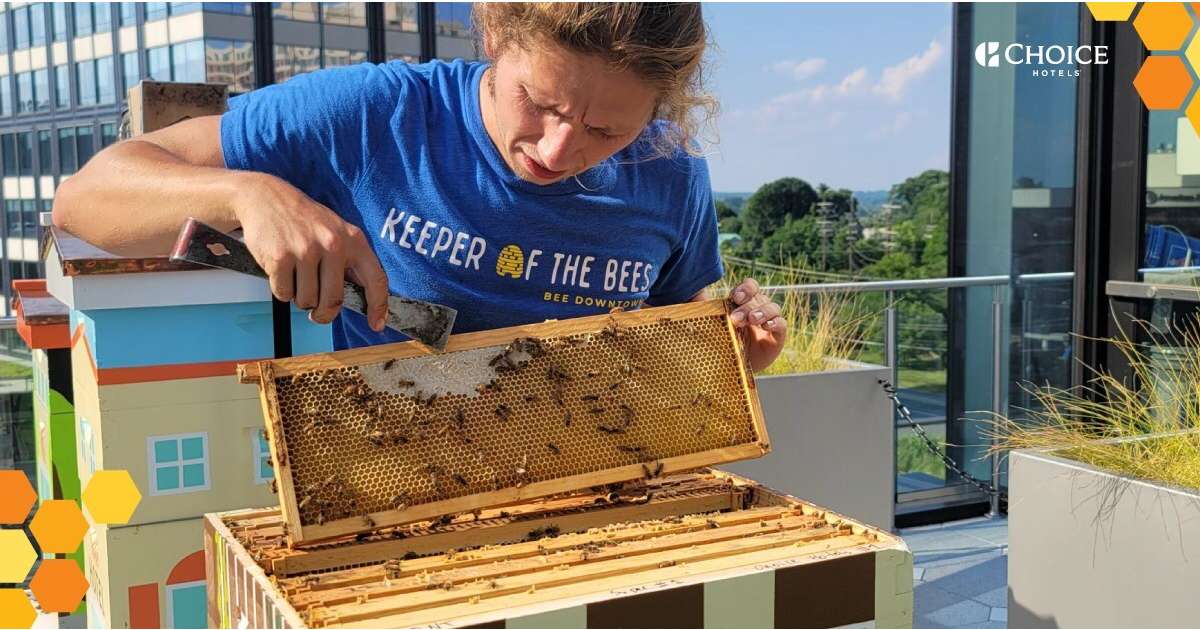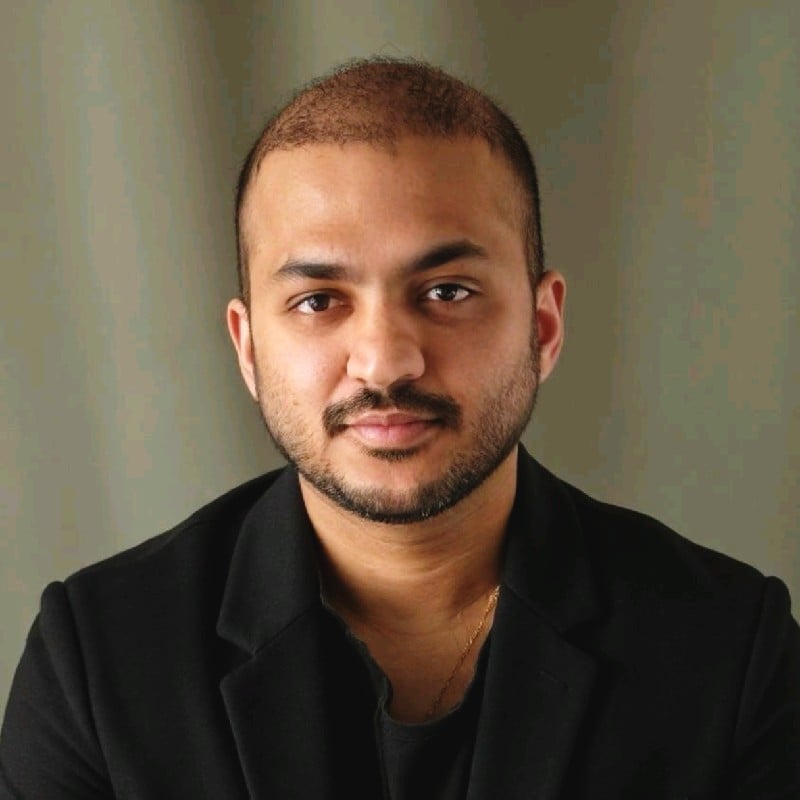
Yotelpad London Stratford is the first opening for the brand in Europe.
Yotelpad
One of the three Yotel brands, YOTELPAD is now setting its sights on a worldwide, extended stay platform in an effort, according to Yotel executives, to “democratize the extended stay market” and offer something unique in a sea of other brands offering long-stay alternatives while keeping costs in check.
A room in Yotel London Gatwick airport, where the bed can fold out like a business class airline seat.
Yotelair
Yotel began as an airport-focused, short-stay brand, now known as YOTELAIR, with cabin-like rooms (as well as larger accommodations) in a modernized take on Japan’s capsule hotels. The target customer was staying anywhere from a few hours to overnight. It has since grown to offer more traditional hotels as well as those targeting people staying anywhere from a week to several months (and competing more with apartments or home rentals than hotels).
Last year, YOTELPAD opened its first extended stay hotel in Europe with plans for more, as well as in other parts of the world.
Marriott and InterContinental Hotels Group, among others, have strong portfolios of long-stay hotel options. They offer formidable competition with global reservations platforms, extensive loyalty programs, and in many, additional perks like free breakfast. They appear in urban and suburban markets as well as airport locations.
The pool area at the combination of Yotel and Yotelpad in Miami
Yotel
Instead of fighting the competition where they already are, Yotel is looking for new markets that need attention. It searches for real estate in places where there is both business and leisure demand, but is also not afraid to be mutually exclusive if it is a good fit. The brand has also moved into the franchise model, similar to other hospitality companies, and looks for both conversion or adapted re-use opportunities as well as potential new-build properties.
A studio at Yotelpad London Stratford
Yotelpad
Take, for example, its newest opening YOTELPAD London Stratford, which sits in an emerging part of London that is home to the main stadium during the London Olympic Games as well as several corporate headquarters. It sits on the fringe of the general tourist sights, but brings a long-stay model to an area where there is little competition and it is needed.
Mission control at London Stratford
Yotelpad
The concept is minimalist with one central area known as mission control replacing traditional front desks and featuring airport-style kiosks that deliver the same services with faster speed. Instead of restaurants, Yotel offers grab-and-go markets that rely heavily on local producers rather than big-name brands.
Yotel is best known for its compact, almost-bunk-like hotel rooms in airports and city centers. But, the brand’s history and current growth trajectory is interesting in where it is going and why.
The backstory
The YO! brand founder Simon Woodroffe, who appeared on “Dragon’ Den,” a British reality show similar to “Shark Tank” and served as one of the judges, is responsible for many brands with the Yo prefix, including Yo! Sushi and YOTELAIR where he used the design of Yotel to bring the brand into other markets. From a business class flight he took to Japan, he developed the idea to take the idea of a hotel stay farther.
Like a business class seat, Yotelair rooms offer the perks needed for a short stay in a compact space.
Yotelair
He was literally translating his interest in travel and long-haul premium cabins into a form of hospitality. And it worked.
Yotel has grown to operate more than a dozen hotels in differing markets from the confined spaces of airports for layover stays to city-center locations.
The current situation
The living room of a studio at the new Yotelpad Park City, which was the first one in the portfolio to open.
Yotelpad
From the original idea, the company now has three brands: YOTEL, YOTELAIR and YOTELPAD. They each target specific markets and use the signature studio-style accommodation as its format. This varies from super-small rooms in an airport hotel to the extended stay model of YOTELPAD, which launched its first hotel in Park City, Utah, followed by a dual-branded YOTEL and YOTELPAD in Miami, complete with beach access and chairs. The rooms’ original inspiration for all three brands came from Japanese capsule hotel and yacht cabins, but the shift into extended stay expands upon that with more space.
In recent months, Yotel opened its first hotel in Japan in the bustling Ginza district of Tokyo.
Yotel
YOTELPAD is one of the company’s key targets as extended stays are a growing segment in hospitality. According to The Business Research Company, the extended stay industry is expected to grow to more than $80 billion in the coming years. This has brought Yotel into markets where it finds a fit for business travelers that need accommodations for longer stays and tourists that want a bit more than what a traditional hotel can offer them.
The newest opening, and the first for YOTELPAD in Europe, is London Stratford on the outskirts of the city center. The hotel features 62 studios (known as PADs) targeting the customer that wants a longer stay with perks like kitchenettes and laundry facilities.
Guests check in using kiosks rather than at a traditional front desk.
Yotel
Digital nomads are a focus as the sector is seeing more travelers blend business and leisure (often dubbed bleisure) into the same trip. By 2032, business travel software developer Navan expects the “bleisure” trend could reach more than $731 billion. That leaves a lot of opportunity on the table.
Instead of renting a multi-bedroom apartment or Airbnb, YOTELPAD taps into an audience that likes the benefits of a hotel. While Yotels traditionally have facilities like a bar, lounge and gym, its extended stay properties are more like an apartment building without much communal space. According to brand executives though, future destinations will offer co-working space to attract the growing digital nomad segment.
Coming soon are properties in Brussels and Geneva and the potential for more in Asia, where the brand sees strong potential.
When folded up, the beds look more like sofas.
Yotelpad London Stratford
When asked about the most common complaint for YOTELPAD guests, Yotel executives joke that it is the space-saving bed, which folds up at the touch of a button converting to a sofa for day use and providing more room within the studio. It is similar to a business class airline seat that is wider, but at first, some consumers may not realize that it folds out thinking the bed is narrow that requires sleeping sideways.
And the biggest compliment? Guests love the Urban Jungle toiletry brand that all Yotel properties use. It became so popular that the hotels now sell them in “mission control.” Yotel has an exclusive hospitality agreement with the Australian brand, and people can also purchase these products in Sephora retailers.
What’s next
A traditional guest room at Yotel New York
Yotel
YOTELPAD is setting its sights on Asia where is has identified a lot of potential, yet undisclosed, markets. So far, YOTELs have opened in Bangkok and Kuala Lumpur. Beyond Asia, a dual YOTEL and YOTELPAD will open in Atlanta next.
“Typically, a luxury hotel is super expensive in Japan. We are disrupting [the segment] between midscale and upscale.”
CEO Hubert Viriot
Opening in Asia had some headwinds for Yotel although Hotel Investments Today reports these have been resolved. At first, Asian investors may have seemed put off by the small size of some rooms. CEO Hubert Viriot says these concerns have now been addressed, and he told the hospitality publication he imagines that eventually Yotel could have 20 properties in Japan, among other markets. He also tells investors that Yotel properties will fit 50% more rooms in the same space of a traditional hotel.
A studio at Yotelpad in Miami
Yotelpad
When the dual-branded Miami property opened, the Miami Herald reported that prices started for its condos started at $250,000, which could then be put into the YOTELPAD rental pool. Not all properties will operate with individual owners, however. Depending on the market, these accommodations can rent for much less than other extended stay properties because of their smaller size (especially in cities like London where space is at a premium).
Viriot says that the Miami property is about real estate investment. In 2022, he told Hotel Business magazine, “they’re more investment properties, and we’ve offered a rental program that we will be managing on their behalf.”
The Yotel robotic luggage concierge can store bags on a wall of shelves until you need them and helps to save space in the room.
Yotel
Yotel properties are light on staff, and instead tap into technology and digital functionalities like kiosks for check-in and amenities, robots to deliver things like towels or other items to the room and even what Yotel calls the “world’s first robotic luggage concierge” that can store luggage when you are away from the hotel.
By the end of the year, Yotel is on track to have 50 hotels in its portfolio. And Viriot has his sights set on something more, hoping to be “ten times bigger in ten years.”
MORE FROM FORBES
Forbes15 Places In Spain You Don’t Want To Skip Out OnBy Ramsey QubeinForbes9 Credit Card Deals For Wimbledon Tickets, Flight Discounts And Free FoodBy Ramsey QubeinForbes5 Ways Andaz Celebrates Youthful Luxury Through Individuality And Local CultureBy Ramsey Qubein


